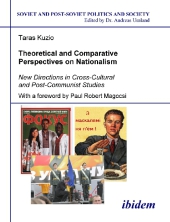 Neuerscheinungen 2019Stand: 2020-02-01 |
Schnellsuche
ISBN/Stichwort/Autor
|
Herderstraße 10
10625 Berlin
Tel.: 030 315 714 16
Fax 030 315 714 14
info@buchspektrum.de |

Taras Kuzio, Paul Robert Magocsi
(Beteiligte)
Theoretical and Comparative Perspectives on Nati - New Directions in Cross-Cultural and Post-Communist Studies
2019. 436 S. 210 mm
Verlag/Jahr: IBIDEM 2019
ISBN: 3-89821-815-5 (3898218155)
Neue ISBN: 978-3-89821-815-3 (9783898218153)
Preis und Lieferzeit: Bitte klicken
This volume brings together 15 articles divided into four sections on theoretical and comparative studies, the role of nationalism in transitions to democracy, the application of theory to country case studies, and the role played by history and myths in the forging of national identities and nationalisms. The book develops new theories and frameworks through engaging with leading scholars of nationalism: Hans Kohns propositions are discussed in relation to the applicability of the term civic (with no ethno-cultural connotations) to liberal democracies, Rogers Brubaker over the usefulness of dividing European states into civic and nationalising states when the former have historically been nationalisers, Will Kymlicka on the applicability of multiculturalism to post-communist states, and Paul Robert Magocsi on the lack of data to support claims of revivals by national minorities in Ukraine. The book also engages with transitology over the usefulness of comparative studies of transitions in regions that underwent only political reforms, and those that had quadruple transitions, implying simultaneous democratic and market reforms, as well as state and nation building. A comparative study of Serbian and Russian diasporas focuses on why ethnic Serbs and Russians living outside Serbia and Russia reacted differently to the disintegration of Yugoslavia and the USSR. The book dissects the writing of Russian and Soviet history that continues to utilize imperial frameworks of history, analyzes the re-writing of Ukrainian history within post-colonial theories, and discusses the forging of Ukraines identity within theories of Others as central to the shaping of identities. The collection of articles proposes a new framework for the study of Ukrainian nationalism as a broader resear


